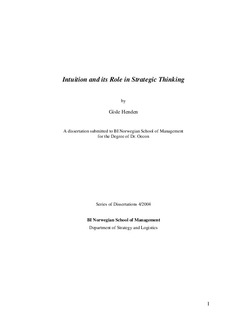Intuition and its role in strategic thinking
Abstract
Even though intuition is recognized as imperative in strategic thinking management literature
is surprisingly silent on the issue. This inquiry thus provides an historical and hermeneutic
review of philosophical, psychological and management theory on intuition. It reveals that
philosophers conceive intuition as rational while psychologists tend not to. Philosophers do so
primarily because intuition is anchored in Ideas, Forms and Archetypes, which are perceived
as a priori laws governing and conditioning all existence. The argument is that intuition is the
ontological foundation for any normative theory of rationality. Implications for the rationality
debate are discussed.
Three levels of intuition are discerned and contrasted with analytical thinking. The first and
second levels correspond to intuitions from the personal and collective unconscious
experience respectively. They can be either introverted or extraverted. The third level
corresponds to what some philosophers call the non-dual, integral state of mind.
An empirical study including personal interviews with 105 Norwegian top managers indicate
that in strategic thinking more emphasis is put on intuition than analysis, especially in
exploration of new terrain and technology. They define intuition primarily in accordance with
level one. In describing its key features they focus on foresight, new ideas and synthesis.
Finally Myers Briggs Type Indicator® was applied, revealing that they have a strong
personality preference for intuition.
